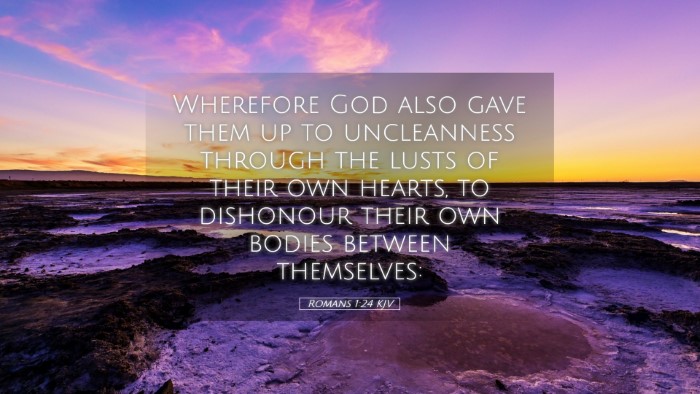Introduction
This verse is part of the Apostle Paul's discourse on the wrath of God revealed against all ungodliness and unrighteousness of men. It serves as a critical juncture in his argument, laying bare the consequences of humanity's rebellion against divine truth. The themes of sin, judgment, and divine abandonment permeate this passage, making it a fertile ground for theological reflection and pastoral application.
Exegesis of the Verse
Paul moves from discussing the general revelation of God in creation (Romans 1:18-23) to the specific words concerning God's response to human sinfulness. Here, he employs a series of "givings up," indicating a judicial action of God in response to persistent sin.
1. "Wherefore God also gave them up"
Matthew Henry notes that this phrase reflects God's sovereignty over human affairs, emphasizing that their sin led to divine abandonment, as if God is allowing them to pursue the path they have chosen. This is a crucial thesis as it establishes that God's judgment often manifests as a withdrawal of restraint on human actions.
2. "to uncleanness"
Albert Barnes elucidates that “uncleanness” refers not only to moral impurity but also to spiritual filthiness. This signifies a state where the heart, unrestrained by divine grace, indulges in desires that lead to corruption both individually and communally.
3. "through the lusts of their own hearts"
Here, we see the source of human depravity. Adam Clarke expounds that it is through their own lusts—cravings for sinful pleasures—where sin originates. Human beings are shown to have a proclivity to be led away by their desires, which implies the necessity for divine intervention through the Holy Spirit to overcome sinful inclinations.
4. "to dishonor their own bodies between themselves"
This phrase speaks to the intimate connection between sin and physicality. Matthew Henry comments that dishonoring their bodies refers to the various types of immoral actions that defile the flesh, a theme echoed throughout Paul’s letters as he emphasizes the bodily resurrection and the sanctity of the body as the temple of the Holy Spirit (1 Corinthians 6:19-20).
Conclusion
Romans 1:24 serves as a sobering reminder of the consequences of sin and the nature of God's judgment. Understanding this verse not only enriches theological discourse but also compels ethical reflections among pastors, students, and scholars alike. The call to recognize the authority of God in moral matters remains pertinent, urging believers toward holiness while extending a hand of grace to those ensnared by sin.


